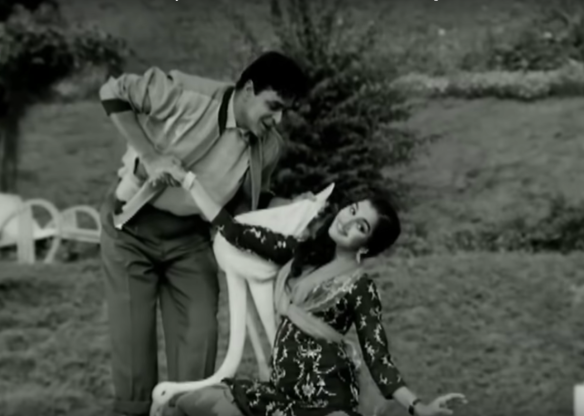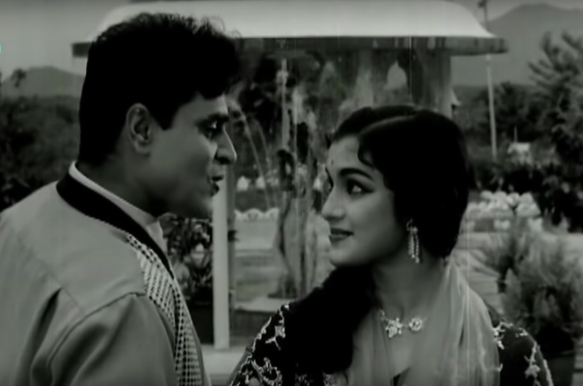-

Rajendra Kumar serenades Asha Parekh in the Vrindavan Gardens of Mysore, India in Gharana (1961)
Today, we present the lyrics and English translation to “Husnwale Tera Jawab Nahin” from Gharana (1961).
Penned by Shakeel Badayuni and composed by Ravi, this song stands out as an eternal favorite in the genre of Bollywood courtship songs, which includes gems such as “Chaudavin Ka Chand Ho” and “Mere Mehboob Tujhe.” Here, Mohammed Rafi lends his silky vocals to Rajendra Kumar, a pairing that dominated the silver screen throughout the ’60s.
This song is filled with several common tropes found in Urdu poetry that are employed to describe a woman’s beauty. These include similes to the Moon, the flowers of springtime, and the intoxication of wine. Interestingly, while “black cloud” has a negative connotation in English, the phrase kaalii ghataa is used here and frequently in other Urdu-Hindi poems to admire the dark color of a woman’s tresses.
The grammar police out there may be wondering: why has the poet chosen to refer to the object of affection here using the male vocative husnvaale instead of the feminine husnvaalii? The answer to this question can be found by understanding the historical origins of the Urdu ghazal, a form that borrows heavily from the Persian tradition. Unlike Urdu-Hindi, the Persian language does not distinguish gender among pronouns/objects. In keeping with this tradition of gender neutrality, Urdu poetry often refers to female objects of affection using masculine pronouns, leaving it up to the reader to perceive gender using other contextual clues. Now you know!
-Mr. 55

Despite being a quintessential romantic here of the 1960s, Rajendra Kumar never received a Filmfare Award.
Husnwale Tera Jawab Nahin: Lyrics and English Translation
husnvaale teraa javaab nahii.n
Oh, beautiful one! There is no match for you.
koii tujh-saa nahii.n hazaaro.n me.n
Among thousands, you are peerless.
tuu hai aisii kalii jo gulshan me.n
You are the flower bud that invites
saath apne bahaar laayii ho
the new Spring to the rose garden.
tuu hai aisii kiran jo raat Dhale
You are the ray of light that, upon nightfall,
chaa.ndnii me.n nahaa ke aayii ho
arrives bathed in the moonlight.
yeh teraa nuur ye tere jalve
Your luster and resplendence shine
jis tarah chaa.nd ho sitaaro.n me.n
like the Moon among the stars.
terii aa.nkho.n me.n aisii mastii hai
Your eyes evoke a deep intoxication,
jaise chhalke hue ho paimaane
like a goblet overflowing with wine.
tere ho.nTho.n me.n voh khamoshii hai
You lips contain the silence of
jaise bikhre hue ho afsaane
hidden tales scattered in the wind.
terii zulfo.n kii aisii rangat hai
The dark hue of your tresses is colored
jaise kaalii ghaTaa bahaaro.n me.n
like the black clouds of springtime.
terii surat jo dekh le shaayar
If a poet were to behold your face,
apne shero.n me.n taazgii bhar le
it would fill his couplets with new passion.
ek musavviir jo tujh ko paa jaaye
If a painter were to meet you,
apne khvaabo.n me.n zindagii bhar le
it would fill the creations of his dreams with new life.
naghmagar DhuunDh le agar tujh ko
If a songster were to find you,
dard bhar le voh dil ke taaro.n me.n
his tune of melancholy would pull at the heartstrings.
husnvaale teraa javaab nahii.n
Oh, beautiful one! There is no match for you.
Glossary
husnvaale: beautiful one; javaab: match; tujh-saa: like you; kalii: flower bud; gulshan: rose garden; chaa.ndnii: moonlight; nahaanaa: to bathe; nuur: light, luster; jalvaa: passion, resplendence; chaa.nd: moon; sitaaraa: star; mastii: intoxication; chhalke hue: spilled, overflowing; paimaanaa: goblet; khamoshii: silence; bikhre hue: scattered; afsaanaa: tale; zulfe.n: tresses; rangat: color; ghaTaa: cloud; surat: face; shaayar: poet; sher: couplet; taazgii: freshness, passion; musavviir: painter; naghmagar: songster; dil ke taar: heartstrings.

Rajendra Kumar and Asha Parekh star in their first film together in Gharana (1961)
